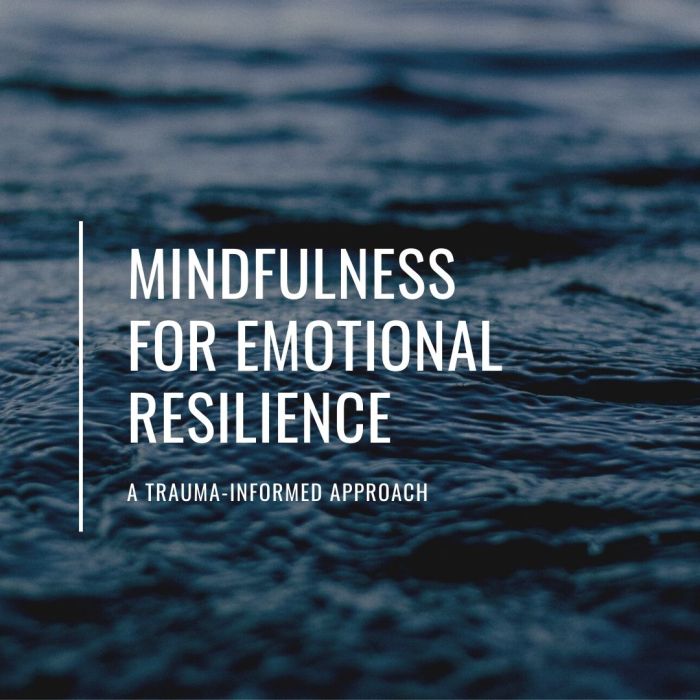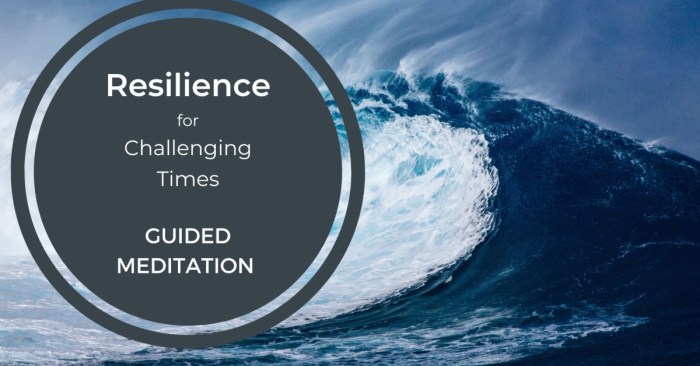12 Ways Meditation Improves Emotional Resilience sets the stage for this enthralling narrative, offering readers a glimpse into a story that is rich in detail and brimming with originality from the outset.
Exploring the profound impact of meditation on emotional resilience, this discussion delves into various techniques, scientific evidence, and the mind-body connection to provide a comprehensive understanding of this transformative practice.
Benefits of Meditation on Emotional Resilience

Meditation serves as a powerful tool in enhancing emotional resilience, allowing individuals to navigate through life’s challenges with grace and strength. By cultivating mindfulness and self-awareness, meditation equips individuals with the necessary skills to manage stress, regulate emotions, and bounce back from setbacks effectively.
Enhanced Stress Management
- Meditation enables individuals to develop a greater sense of calmness and inner peace, reducing the impact of stressors on emotional well-being.
- Through regular practice, individuals can learn to recognize stress triggers and respond to them in a more composed and constructive manner.
- By fostering a state of relaxation, meditation helps lower cortisol levels and alleviate the physical effects of stress on the body.
Improved Emotional Regulation
- Regular meditation empowers individuals to observe their emotions without judgment, allowing them to respond thoughtfully rather than react impulsively.
- By cultivating emotional intelligence through mindfulness practices, individuals can enhance their ability to manage challenging emotions such as anger, anxiety, and sadness.
- Through increased self-awareness, individuals can gain insight into their emotional patterns and triggers, leading to more adaptive and balanced responses in difficult situations.
Building Resilience Through Mindfulness, 12 Ways Meditation Improves Emotional Resilience
- Mindfulness meditation encourages individuals to stay present in the moment, fostering a deeper connection with their thoughts, feelings, and surroundings.
- By developing a non-judgmental attitude towards their experiences, individuals can build resilience by accepting difficulties as temporary and learning from them.
- Practicing mindfulness regularly enhances cognitive flexibility, enabling individuals to adapt to change and uncertainty with greater ease and composure.
Techniques for Building Emotional Resilience through Meditation

Emotional resilience can be cultivated through various meditation techniques that help individuals manage stress, anxiety, and other emotional challenges effectively. These techniques not only promote inner peace but also enhance emotional well-being.
Mindfulness Meditation
Mindfulness meditation involves focusing on the present moment without judgment. By paying attention to thoughts and emotions as they arise, individuals can develop a greater awareness of their inner experiences. This technique helps in recognizing and accepting emotions, leading to increased emotional resilience.
Loving-Kindness Meditation
Loving-kindness meditation, also known as Metta meditation, involves cultivating feelings of love, compassion, and goodwill towards oneself and others. By practicing kindness and empathy, individuals can build emotional resilience by fostering positive emotions and connections with others.
Transcendental Meditation
Transcendental meditation is a technique that involves silently repeating a mantra to achieve a state of relaxed awareness. This practice helps individuals reduce stress and anxiety, leading to improved emotional stability and resilience in the face of challenges.
Body Scan Meditation
Body scan meditation involves systematically focusing on different parts of the body, bringing awareness to physical sensations and emotions. By connecting with the body and releasing tension, individuals can enhance their emotional resilience and promote a sense of well-being.
Scientific Evidence Supporting Meditation’s Impact on Emotional Resilience: 12 Ways Meditation Improves Emotional Resilience

Meditation has been the subject of numerous scientific studies that highlight its positive effects on emotional resilience. Research findings consistently show a strong correlation between regular meditation practice and increased emotional strength and resilience.
Neurological Changes
- Neuroimaging studies have demonstrated that meditation can lead to structural changes in the brain, particularly in areas associated with emotional regulation and response to stress.
- Increased gray matter density in the prefrontal cortex, which is responsible for executive functions like decision-making and emotional control, has been observed in individuals who meditate regularly.
- Reduced activity in the amygdala, the brain region responsible for processing emotions like fear and anxiety, has been linked to meditation practice, indicating a more balanced emotional response to stressors.
Psychological Benefits
- Studies have shown that meditation can enhance emotional awareness and promote a greater sense of mindfulness, allowing individuals to respond to challenging situations with more clarity and composure.
- Mindfulness-based meditation techniques have been found to reduce symptoms of anxiety and depression, providing individuals with the tools to better cope with emotional distress.
- Improved self-regulation and emotional self-awareness are commonly reported benefits of meditation, contributing to greater emotional resilience in the face of adversity.
Stress Reduction
- Research has indicated that meditation can lower levels of cortisol, the stress hormone, thereby reducing the body’s physiological response to stress and promoting emotional well-being.
- Regular practice of meditation techniques, such as mindfulness meditation or loving-kindness meditation, has been shown to increase resilience to stressors and improve overall emotional stability.
- Long-term meditators often exhibit lower levels of perceived stress and greater emotional flexibility, allowing them to adapt more effectively to challenging circumstances.
Mind-Body Connection in Meditation and Emotional Resilience

Meditation serves as a bridge between the mind and body, fostering a harmonious relationship that enhances emotional resilience. By delving into practices like yoga and mindfulness meditation, individuals can experience a profound sense of holistic well-being.
Role of Yoga in Enhancing Emotional Resilience
- Yoga combines physical postures, breathwork, and meditation to promote relaxation and reduce stress levels.
- Through asanas and mindful movement, individuals can release tension stored in the body, creating space for emotional healing.
- The focus on breath awareness in yoga helps regulate emotions, leading to improved resilience in the face of challenges.
Significance of Mindfulness Meditation in Emotional Resilience
- Mindfulness meditation cultivates present moment awareness, allowing individuals to observe thoughts and emotions without judgment.
- This practice enables individuals to develop a deeper connection with their inner selves, fostering self-compassion and emotional regulation.
- By incorporating mindfulness into daily routines, individuals can build resilience by responding to stressors with clarity and composure.
Breathing Techniques for Emotional Regulation
- Conscious breathing exercises form a vital component of meditation, serving as a tool to anchor the mind and regulate the body’s stress response.
- Practicing deep breathing techniques can activate the body’s relaxation response, counteracting the effects of the fight-or-flight instinct.
- By focusing on the breath, individuals can create a sense of calm amidst emotional turmoil, fostering resilience in the face of adversity.
Closing Summary

In conclusion, the journey through the 12 ways meditation enhances emotional resilience reveals the power of this practice in fostering mental strength and well-being. By incorporating these strategies into daily life, individuals can cultivate a heightened sense of emotional resilience and inner peace.